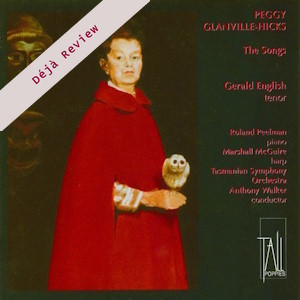
Déjà Review: this review was first published in July 2003 and the recording is still available.
Peggy Glanville-Hicks (1912-1990)
The Songs
Profiles from China (1945)
Three Songs (1931)
Mimic Heaven, Five Songs by A.E. Housman (1944)
Sonata for Harp (1952)
Thirteen Ways of Looking at a Blackbird (1948)
Letters from Morocco (1952)
Gerald English (tenor)
Roland Peelman (piano) all items except
Marshall McGuire (harp)
Tasmanian Symphony Orchestra/Antony Walker
rec. 1993-94, Llewellyn Hall, Canberra School of Music; Studio 200, ABC Sydney; Hobart
Tall Poppies TP112 [58]
This is a consistently enjoyable and rewarding disc. It furnishes further evidence of Peggy Glanville-Hicks’s intensely reflective and evocative response to text, whether poetic or, in the case of the Paul Bowles inspired piece, prose. A student variously and successively of Vaughan Williams, Wellesz and Nadia Boulanger she spent much of her life outside her native Australia, only returning full-time in 1975. It’s not at all surprising, given the prominence of operatic work in her creative life, that she should be so accomplished a setter for voice and piano but it’s true that the songs have been rather overlooked. No longer.
Profiles from China, five tiny settings dating from 1945, are aptly delicate in their narrative simplicity. The jewel is the third, The Dream, the spaced chordal strength of which mirrors the philosophic compactness of the poem by Eunice Tietjens, who died the year before Glanville-Hicks began work on her poems. The Three Songs are early works dating from 1931 of two settings of A.E. and one of Fletcher’s Sleep. Frolic sounds a little like reharmonised and modernised Butterworth. Sleep embodies a gentle nobility, a beguiled ecstasy that adduces an appropriately quasi-Elizabethan cadence: not in the manner of W Denis-Browne say, of an earlier generation, but more glintingly and very attractively. Mimic Heaven from the Housman settings taxes even the supremely idiomatic Gerald English up high but how beautifully he explores Glanville-Hicks’s dropping motif in He Would Not Say and how heart-rending is his delivery – how poignant the balance of melancholy and aloofness. This set positively glitters with drama and loss, the dramatic piano arpeggio in Stars included, as it does in more confident face – Homespun Collars the last of the five is confident, rhythmically a-quiver. English and pianist Roland Peelman are jaunty and swaggering.
The Harp Sonata makes a welcome appearance at this point played by Marshall McGuire. In three short movements this delightfully lyric piece is suffused in affection and heart-warming melody but also a sure awareness of the harp’s potential. Its technical grounding is not in doubt. Thirteen Ways of Looking at A Blackbird sets Wallace Stevens’ poems with the utmost concision and concentration, employing declamation from the singer – in When the Blackbird Flew Out Of Sight – as well as suggestive underscoring of beautifully crafted refinement. At the sight of blackbirds flying is one of the most beautifully taut settings of a poem I’ve ever heard. There’s also abandon and verve – He rode over Connecticut – and plenty of contrastive material. The disc ends with Letters from Morocco, the settings of Bowles’ letters and accompanied by orchestra. She sets the polysyllabic words with great deftness – it can’t be easy to set the prose line where life is prohibited it becomes a delectable forbidden fruit,for example. Bowles and Glanville-Hicks were long-standing friends and wrote regularly to each other. The settings are evocative, colouristic, hinting at strange lands, burnished and supportive of the text. English essays the occasional melismatic cry with unerring skill and the depth and richness and the sheer subtlety of the settings are made only more palpable through repeated listening.
The cover painting is of the composer in a red cloak with a barn owl sitting on her outstretched and gloved hand. Her just visibly jutting shirtsleeve or jumper shares the owl’s brown and whiteness and hints, perhaps, at her cool, avian otherness. Or whatever. Her music meanwhile has always filled me with the greatest admiration and this disc is recommended with undimmed enthusiasm.
Jonathan Woolf
Availability: Buywell Music


















